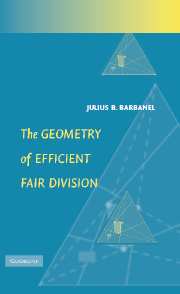Book contents
- Frontmatter
- Contents
- Introduction by Alan D. Taylor
- 1 Notation and Preliminaries
- 2 Geometric Object #1a: The Individual Pieces Set (IPS) for Two Players
- 3 What the IPS Tells Us About Fairness and Efficiency in the Two-Player Context
- 4 The Individual Pieces Set (IPS) and the Full Individual Pieces Set (FIPS) for the General n-Player Context
- 5 What the IPS and the FIPS Tell Us About Fairness and Efficiency in the General n-Player Context
- 6 Characterizing Pareto Optimality: Introduction and Preliminary Ideas
- 7 Characterizing Pareto Optimality I: The IPS and Optimization of Convex Combinations of Measures
- 8 Characterizing Pareto Optimality II: Partition Ratios
- 9 Geometric Object #2: The Radon–Nikodym Set (RNS)
- 10 Characterizing Pareto Optimality III: The RNS, Weller's Construction, and w-Association
- 11 The Shape of the IPS
- 12 The Relationship Between the IPS and the RNS
- 13 Other Issues Involving Weller's Construction, Partition Ratios, and Pareto Optimality
- 14 Strong Pareto Optimality
- 15 Characterizing Pareto Optimality Using Hyperreal Numbers
- 16 Geometric Object #1d: The Multicake Individual Pieces Set (MIPS) Symmetry Restored
- References
- Index
- Symbol and Abbreviations Index
Introduction by Alan D. Taylor
Published online by Cambridge University Press: 19 August 2009
- Frontmatter
- Contents
- Introduction by Alan D. Taylor
- 1 Notation and Preliminaries
- 2 Geometric Object #1a: The Individual Pieces Set (IPS) for Two Players
- 3 What the IPS Tells Us About Fairness and Efficiency in the Two-Player Context
- 4 The Individual Pieces Set (IPS) and the Full Individual Pieces Set (FIPS) for the General n-Player Context
- 5 What the IPS and the FIPS Tell Us About Fairness and Efficiency in the General n-Player Context
- 6 Characterizing Pareto Optimality: Introduction and Preliminary Ideas
- 7 Characterizing Pareto Optimality I: The IPS and Optimization of Convex Combinations of Measures
- 8 Characterizing Pareto Optimality II: Partition Ratios
- 9 Geometric Object #2: The Radon–Nikodym Set (RNS)
- 10 Characterizing Pareto Optimality III: The RNS, Weller's Construction, and w-Association
- 11 The Shape of the IPS
- 12 The Relationship Between the IPS and the RNS
- 13 Other Issues Involving Weller's Construction, Partition Ratios, and Pareto Optimality
- 14 Strong Pareto Optimality
- 15 Characterizing Pareto Optimality Using Hyperreal Numbers
- 16 Geometric Object #1d: The Multicake Individual Pieces Set (MIPS) Symmetry Restored
- References
- Index
- Symbol and Abbreviations Index
Summary
Notions of obvious breadth and importance should, when possible, be examined under a number of different disciplinary lenses. This is the spirit in which the present offering by Julius Barbanel (a mathematician) joins recent books by Hervé Moulin (an economist) [32] and Nicholas Rescher (a philosopher) [35]. But fairness – or, more explicitly, fair division – comes in a number of different flavors, and we should begin by setting forth something of a general framework in which we can place the present book.
One of the more important dichotomies in the treatment of fairness is the extent to which the treatment is normative. Is the author trying to argue that certain methods of allocation are superior to others? The treatment of fair division by economists, philosophers, and political scientists tends to lie in the normative camp. Mathematicians, on the other hand, focus on what is possible and what is not, and often leave subjective judgments to others, as Barbanel does here.
Yet there is a normative aspect of the present work that sets it apart from the great majority of mathematical treatments, and it is revealed in Barbanel's choice of title. The work is not called “The Geometry of Fair Division” but “The Geometry of Efficient Fair Division.” Efficiency – also called Pareto optimality, after the nineteenth-century Italian scholar Vilfredo Pareto – is, according to Hervé Moulin, “the single most important tool of normative economics” [32, pg. 8].
- Type
- Chapter
- Information
- The Geometry of Efficient Fair Division , pp. 1 - 6Publisher: Cambridge University PressPrint publication year: 2005



